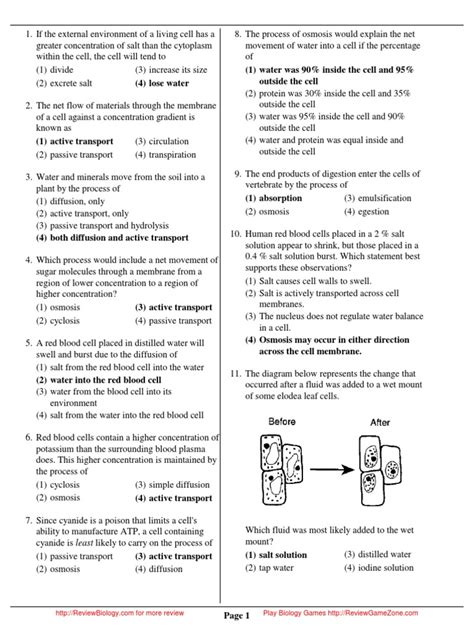Introduction

The biological concepts Regents exam is a standardized test given to high school students in New York State. The exam covers a wide range of topics in biology, including the nature of science, the cell, genetics, and evolution. Students who are preparing for the exam should be familiar with these topics and be able to apply their knowledge to new situations.
Nature of Science
- What is science? Science is a way of thinking about the world that is based on evidence and logic. Scientists use the scientific method to test hypotheses and develop theories.
-
What are the steps of the scientific method? The steps of the scientific method are:
- Make an observation
- Ask a question
- Form a hypothesis
- Test the hypothesis
- Draw a conclusion
-
What are the characteristics of a good hypothesis? A good hypothesis is:
- Testable
- Falsifiable
- Specific
- Relevant
The Cell
- What is a cell? A cell is the basic unit of life. All living things are made up of cells.
-
What are the different parts of a cell? The different parts of a cell include the:
- Cell membrane
- Cytoplasm
- Nucleus
- Ribosomes
- Mitochondria
- Golgi apparatus
- Endoplasmic reticulum
-
What are the functions of the different parts of a cell? The different parts of a cell perform a variety of functions, including:
- The cell membrane regulates what enters and leaves the cell.
- The cytoplasm contains the organelles and other structures of the cell.
- The nucleus contains the DNA of the cell.
- The ribosomes synthesize proteins.
- The mitochondria produce energy for the cell.
- The Golgi apparatus modifies and packages proteins.
- The endoplasmic reticulum transports materials around the cell.
Genetics
- What is genetics? Genetics is the study of heredity and variation.
- What are genes? Genes are segments of DNA that code for proteins.
- How are genes inherited? Genes are inherited from parents to offspring. Each parent contributes one copy of each gene to their offspring.
- What is a genotype? A genotype is the genetic makeup of an organism.
- What is a phenotype? A phenotype is the observable characteristics of an organism.
- How do genotype and phenotype interact? Genotype and phenotype interact to determine the traits of an organism.
Evolution
- What is evolution? Evolution is the process by which populations of organisms change over time.
-
What are the mechanisms of evolution? The mechanisms of evolution include:
- Natural selection
- Genetic drift
- Gene flow
- What is natural selection? Natural selection is the process by which organisms that are better adapted to their environment are more likely to survive and reproduce.
- What is genetic drift? Genetic drift is the random change in the frequency of alleles in a population.
- What is gene flow? Gene flow is the movement of alleles from one population to another.
Regents Exam Questions
The following are some Regents exam questions that cover the topics in Unit 1.
Nature of Science
-
Which of the following is NOT a step of the scientific method?
- (A) Make an observation
- (B) Form a hypothesis
- (C) Collect data
- (D) Draw a conclusion
-
Which of the following is a characteristic of a good hypothesis?
- (A) It is testable.
- (B) It is falsifiable.
- (C) It is specific.
- (D) All of the above
The Cell
-
Which of the following is NOT a part of a cell?
- (A) Cell membrane
- (B) Nucleus
- (C) Ribosome
- (D) Golgi apparatus
-
Which of the following is the function of the cell membrane?
- (A) To regulate what enters and leaves the cell
- (B) To synthesize proteins
- (C) To produce energy for the cell
- (D) To modify and package proteins
Genetics
-
Which of the following is NOT a mechanism of inheritance?
- (A) Mitosis
- (B) Meiosis
- (C) Fertilization
- (D) Transduction
-
Which of the following is NOT a type of mutation?
- (A) Point mutation
- (B) Frameshift mutation
- (C) Nonsense mutation
- (D) Deletion mutation
Evolution
-
Which of the following is NOT a mechanism of evolution?
- (A) Natural selection
- (B) Genetic drift
- (C) Gene flow
- (D) Mutation
-
Which of the following is NOT a factor that can affect the rate of evolution?
- (A) Population size
- (B) Selection pressure
- (C) Gene flow
- (D) Temperature
Answer Key
Nature of Science
- C
- D
The Cell
- C
- A
Genetics
- A
- D
Evolution
- D
- D
